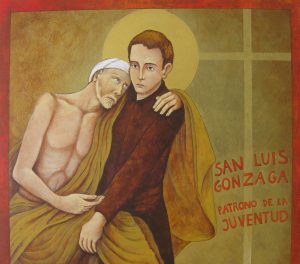HOMILY WEEK 11 03 – Year I
The Biblical Faith Triad:
Memorial of St. Aloysius Gonzaga
(2 Cor 9:6-11; Ps 112; Mt 6:1-18)
*********************************************************
Today’s readings actually bring to mind a humble biblical faith triad.
This triad invites us to express our faith in Jesus by generous almsgiving, sincere prayer and humble self-care.
Jesus in the gospel instructs his disciples first of all to be humble in whatever they do, especially in almsgiving, prayer and fasting. They are to give alms “in secret” so as to not draw attention to themselves, but to do it for God alone. The same applies for their prayer life – to do that also in such as way that it is done for God and not to impress others, and finally, to fast in such a way that others don’t even notice. That humility ensures the integrity of our faith life – just the opposite of the scribes and Pharisees who, it seems, loved to draw attention to themselves in doing these three practices.
It is interesting that these three practices are also the disciplines the Church encourages us to practice during Lent – to give alms, to fast and to pray.
What is even more interesting is these three practices also coincide with the Great Commandment that is at the core of Jesus’ teaching – to love God with our whole being, and to love our neighbour as we love ourselves.
To enter into sincere prayer from the heart is to love God with our whole mind, strength and soul. We do that through either discursive or contemplative prayer, through private devotion or through the public priestly prayer of Jesus Christ in the Eucharist.
To give alms is to love our neighbour. We give alms by giving of our time, treasure and talent, as it is often put in social justice circles. To spend time with others listening to their deepest concerns is a beautiful way to give alms. So too is to volunteering to help out in charitable activities, as well as helping others financially.
To fast is to actually love our selves, to pay attention to our inner self, to de-clutter our lives of some food or activity so we can be more mindful and get to know ourselves at a deeper level than before.
St. Paul, in the first reading, adds to the action of almsgiving. We are to do that generously, with a cheerful heart and an attitude of gratitude for all God’s blessings to us. It is striking that in one passage addressing the Corinthians, he praises them for their generosity and joy in the midst of their poverty and afflictions. They truly were a people of faith who could live and take to the heart these teachings of Jesus.
 Today is the memorial of St. Aloysius Gonzaga (1568-91). He is another example of someone who lived today’s gospel – who lived a life of prayer, fasting and almsgiving. He is patron saint of young men. Born a prince of the nobility in Lombardy, Aloysius began to practice prayer and penance at a young age, rejecting the materialistic values of his position and family. Against great resistance, in 1585 he gave up his possessions and his rights as the eldest son and joined the Jesuits, hoping to go to the missions. Instead, in 1591 the plague broke out in Rome, and Aloysius offered himself to serve the sick and dying in the hospital. He caught the plague and died three months later at just 23 years of age. He was canonized in 1726. As Jesus himself stated, there is no greater love than to lay one’s life down for others, and that is what Aloysius did.
Today is the memorial of St. Aloysius Gonzaga (1568-91). He is another example of someone who lived today’s gospel – who lived a life of prayer, fasting and almsgiving. He is patron saint of young men. Born a prince of the nobility in Lombardy, Aloysius began to practice prayer and penance at a young age, rejecting the materialistic values of his position and family. Against great resistance, in 1585 he gave up his possessions and his rights as the eldest son and joined the Jesuits, hoping to go to the missions. Instead, in 1591 the plague broke out in Rome, and Aloysius offered himself to serve the sick and dying in the hospital. He caught the plague and died three months later at just 23 years of age. He was canonized in 1726. As Jesus himself stated, there is no greater love than to lay one’s life down for others, and that is what Aloysius did.
The Eucharist is a blending of all three of these practices – we fast before celebrating in preparation to receive our Lord in communion, we give alms in the collection, and it is also our greatest prayer.
It also commits us to go out and live the Eucharist, especially through this humble biblical faith triad of almsgiving, prayer and fasting.



